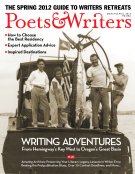Strayed had no idea that within a very short time thousands of readers would be tweeting about her column and e-mailing her on the Rumpus website, and that her decision, like Almond’s, to remain anonymous would be part of her allure. Most important, she began to see how her answers became for her a meaningful, hybrid art form: part self-help, part memoir, and part personal essay. Her answers to the queries from her devoted readers often ran up to four thousand words. She took the questions seriously and spent days writing thoughtful, provocative answers.
In one of her most famous installments a young woman wrote, “I write like a girl, I write about my lady life experiences, and it usually comes out as unfiltered emotion, unrequited love, and eventual discussion of my vagina as a metaphor…right now, I am a pathetic and confused young woman who can’t write.” The writer went on and on, lamenting how she would never be a great writer like David Foster Wallace.
Strayed replied: “The most fascinating thing to me about your letter is that buried beneath all the anxiety and sorrow and fear and self-loathing, there’s arrogance at its core. It presumes you should be successful at twenty-six, when really it takes most writers so much longer to get there. It laments that you’ll never be as good as David Foster Wallace—a genius, a master of the craft—while at the same time describing how little you write. You loathe yourself, and yet you’re consumed by the grandiose ideas you have about your own importance. You’re up too high and down too low. Neither is the place where we get any work done.”
She concluded: “So write.… Not like a girl. Not like a boy. Write like a motherfucker.” The quote is now featured on a best-selling coffee mug that readers of the Rumpus can purchase from the website.
“Some of my best writing is in that column,” Strayed admits. “I gave my whole heart, my whole spirit to that column. It became so much bigger and more meaningful to me as an artist than I ever dreamed it would.”
Last month Strayed revealed her identity as Sugar to a crowd of faithful readers and devotees of the column at a special Valentine’s Day party sponsored by the Rumpus at the historic Verdi Club in San Francisco’s Mission District. The party featured a conversation with Strayed and Almond, the original Sugar, as well as the announcement that a collection of Strayed’s most memorable Dear Sugar installments will be published by Vintage in June.
If Strayed is ruffled by the growing attention, which recently included a Vogue photo shoot replete with a team of stylists and makeup artists who descended on her humble Portland home and, she says, turned her into “someone I did not recognize when I looked in the mirror,” she doesn’t show it. She remains, as Pam Houston says, “completely herself. There are no facades, no masks.”
Even now, though not often, I still grieve the loss of my mom,” Strayed says softly as we search her home for her elusive cat Gulla. “At first I was frozen and trapped without her, and if I admitted anything except that I loved her—and back then, that was the greatest truth—if I let anything else in, I would lose my grip on her. Now I honor my mom in a different way. For the longest time, I was only defining her in relationship to me. It took hiking the PCT to understand the fullness of my grief—to see that, outside of being my mom, she was a real person who had, at such a young age, lost her life. I came to see that my grief could transform itself from how her death had affected me, to how it had taken her from her own vibrant life.”
We search high and low for the cat. Strayed’s office is lined with books, and her bedroom, where Gulla usually hides, is neat and cozy. But Gulla is nowhere to be found. Strayed explains that when she first brought the cat home after finding it half-dead along the highway, she found out the hard way that a scared animal could literally climb the walls. “She was crazy—wild,” she says. “I grabbed her when she was halfway up the bathroom wall and as soon as I held her against my body she went limp. Then she was purring.”
For now Gulla is hidden away. She is watching us, or stalking us, or maybe just resting somewhere in a patch of sunlight that pierces the bedroom windows as the dark clouds part again.
Leslie Schwartz is the author of the novels Angels Crest (Doubleday, 2004) and Jumping the Green (Simon & Schuster, 1999). The film version of Angels Crest debuted nationwide in January. Her short stories, essays, and articles have been published in various venues, including the Los Angeles Times, Teachers & Writers, Sonora Review, Kalliope, and Jacaranda Review.









